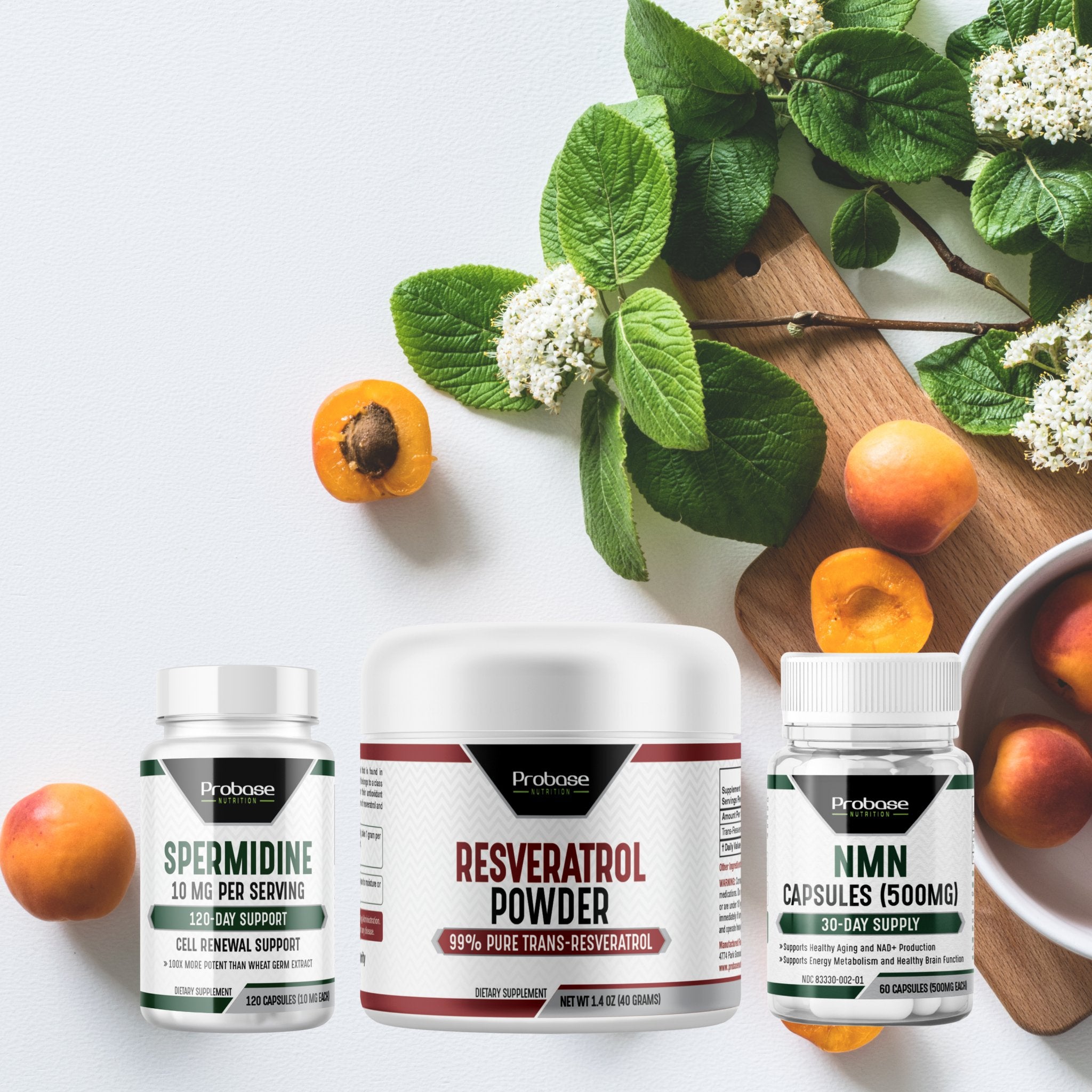What is the scientific basis behind some of the most fascinating supplements aimed at slowing down the aging process?
Furthermore, how can we determine whether these substances are truly capable of slowing down aging, particularly in humans?
The reality is that conducting a perfect longevity study in humans is almost impossible. It would necessitate the involvement of thousands of individuals who consistently use a nutraceutical, medication, or therapy for a period of 30 to 50 years, while also incurring the costs associated with monitoring their health and lifespan outcomes. Such a study would span several decades and require tens, if not hundreds, of millions of dollars.
Given that none of us have the luxury of waiting for decades, and due to the lack of funding for such studies, we must explore alternative methods of assessing the potential positive effects of specific substances on lifespan.
Let's begin by considering the selection criteria. Ideally, the substances included in a synergistic longevity formulation should adhere to the following principles:
1. Their Potential to Simultaneously Influence Multiple Mechanisms of Aging

In the past decade, scientists have elucidated numerous mechanisms that contribute to the aging process. Longevity researchers have defined 12 significant mechanisms, which are detailed on our causes of aging page.
These aging mechanisms encompass various aspects such as epigenetic alterations, proteostasis decline (accumulation of proteins inside and outside cells), cellular senescence, mitochondrial dysfunction, genomic instability, disrupted nutrient sensing, altered intercellular communication, inflammaging, and more. For further information on these aging mechanisms, please refer to our resource.
Numerous substances have been identified to exert beneficial effects on these aging mechanisms.
For instance, fisetin has demonstrated the ability to eliminate senescent cells. Micro-dosed lithium and alpha-ketoglutarate exhibit positive epigenetic effects. Glucosamine can positively impact mitochondrial health, among others.
Hence, an effective longevity supplement incorporates ingredients that target the fundamental hallmarks of aging. However, their impact should extend beyond this requirement, leading us to the second criterion.
Ideally, each ingredient should influence not only one but multiple aging mechanisms.
For instance, glycine exhibits epigenetic effects while also acting as a chaperone, safeguarding proteins and reducing the risk of protein accumulation, which is one of the reasons for aging (proteostasis decline).
Glucosamine enhances mitochondrial health by promoting mitochondrial biogenesis and can also induce autophagy, the process of breaking down proteins that would otherwise accumulate.
By combining such ingredients, synergistic effects on the aging process can be achieved. It is crucial to possess in-depth knowledge of the ingredients, their research, and their biological pathways to avoid any adverse interactions (dysergies).
2. Extending Lifespan in Different Animal Models Points to Conserved Evolutionary Pathways

Ideally, the ingredients should demonstrate lifespan extension not only in a single animal model but across multiple species, including C. elegans (a commonly used organism in aging research), yeast, fruit flies, fish, mice, and other species.
When a compound extends lifespan in diverse species, there is a greater likelihood of its efficacy in humans. However, humans are a long-lived species, and the life-extension effects observed in simpler organisms often have a lesser impact on humans. This necessitates a more potent approach that can only be achieved through synergistic combinations of ingredients.
For instance, alpha-ketoglutarate (AKG) serves as an example of such ingredients. It has been shown to extend lifespan in C. elegans, fruit flies, and mice, while also exhibiting the ability to reduce epigenetic age in humans.
Similarly, glycine has been found to extend lifespan in C. elegans, fruit flies, mice, and rats. Moreover, it is known to possess significant positive effects on human health.
3. Indications of Their Impact on the Underlying Aging Process: Linked to Decreased Risk of Aging-Related Processes and Outcomes in Humans and Animals

The Root Cause of Aging-Related Diseases and the Potential Role of Substances in Addressing Them
The primary cause of aging-related diseases, including heart disease, osteoporosis, most cancers, and Alzheimer's, is the process of aging itself. Generally, individuals in their 20s and 30s are less susceptible to experiencing heart attacks or Alzheimer's.
Aging is, without a doubt, the most significant risk factor for these diseases.
A substance that can simultaneously reduce the risk of various aging-related diseases is likely to target an underlying mechanism that connects these conditions, such as aging itself. Alternatively, it may act on a crucial aging hallmark that contributes to multiple aging-related diseases, such as protein accumulation or mitochondrial dysfunction.
For instance, studies have demonstrated that pterostilbene can decrease the risk of Alzheimer's and diabetes, while also enhancing cardiovascular health, reducing inflammaging, and alleviating arthritis. These conditions and symptoms are all commonly associated with aging.
Considering that pterostilbene can also extend lifespan in animals, it is plausible to suggest that this compound influences aging itself or at least affects one or more aging hallmarks.
4. Linked to Decreased Mortality Risk in Humans
Ideally, scientific studies indicate a correlation between regular supplement intake and reduced mortality rates in humans.
For instance, extensive research conducted in the United States and Europe has revealed that only a few supplements demonstrate a genuine association with decreased mortality risk. Among these supplements, glucosamine has been identified as one of them.
Individuals who regularly consumed glucosamine exhibited a lower risk of mortality. Intriguingly, this supplement also showcased a reduced risk of another prevalent age-related condition, namely heart disease.
Furthermore, additional studies have indicated that the intake of lithium, whether derived from natural drinking water or consumed at very low doses, has been linked to decreased mortality rates. Notably, lithium intake has also demonstrated a connection with a reduced risk of aging-related diseases such as Alzheimer's disease.
5. Nature-Based Elements Found in Food or Human Biology Experience Declining Levels with Age

In an ideal scenario, these substances are derived from natural sources and have coexisted with human evolution, as opposed to being novel, artificially created compounds.
Moreover, it is desirable for these substances to naturally occur within our bodies, and even more so, for their levels to decline as we age. This decline in levels could potentially indicate their safety and the possibility that their diminishing presence contributes to or accelerates the aging process.
Several molecules serve as examples of this pattern, as they are initially present at higher levels in youthful tissues but progressively decrease with age. These include alpha-ketoglutarate, NMN (Nicotinamide Mononucleotide), and glycine.
6. Low to very low side effects
These substances have a well-documented track record of causing minimal, if any, side effects, and certainly no significant adverse effects, even at substantially higher dosages than those employed in the formulation.
7. These Substances Have Been Utilized for Extended Periods, Some Dating Back Centuries, in Human Treatment, Exhibiting Minimal Side Effects
Ideally, these substances have a long history of usage spanning decades or even centuries, demonstrating a notable absence of serious side effects or complications. One illustrative example is glucosamine, which has been widely taken for joint issues over the course of many decades. However, few are aware that glucosamine may also possess the potential to slow down the aging process.
Another instance is alpha-ketoglutarate (AKG), which has been consumed by elite athletes and bodybuilders for several decades to enhance energy levels, with no significant side effects reported. Notably, alpha-ketoglutarate has also been linked to lifespan extension.


